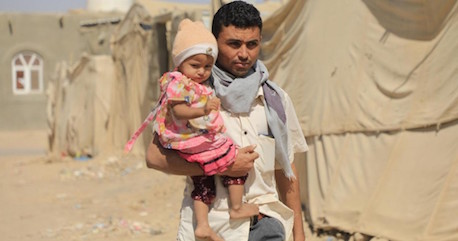More than 10,200 children have been killed or injured since conflict in Yemen escalated in March 2015.
All Yemen’s children have been affected by what has become one of the world’s largest humanitarian crises. Widespread economic collapse and overstretched national systems and services have left 70 percent of the total population, including 11.3 million children, in need of humanitarian assistance to survive.
Heavy fighting pushed Waleed Al-Ahdal, 25, and his family out of their home in Al-Hodeidah governorate in western Yemen. They came to Marib governate five years ago, and are currently living in a camp for the internally displaced in Al-Jufainah. The camp is the largest in the country, with 9,000 families.
“After the conflict broke out and the clashes intensified, I had no other choice but to escape death,” he said. He and his wife are raising their four children in a tent. Living conditions are so harsh that he no longer thinks about preparing for the fasting month of Ramadan.
Back home, Ramadan festivities included “decorating the house and the neighborhood and playing Ramadan songs,” says Waleed, pictured above with Maymouna, 5, Hilalah, 6, Ghosoon, 2, and Khalid, 3. “We used to start shopping for food two weeks before Ramadan began. But now, all days are the same for us. All we think about now is just to secure food for our children and ourselves, so we do not feel hungry all the time.”
Rituals like gathering around the Iftar meal do not look the same as before. “We have no way to rejoice in the month of Ramadan,” Waleed says sadly. “We are facing a difficult reality. I struggle to provide the basics for my family. All I can get is temporary daily work. Because of that, I am burdened with debts, and we find ourselves not able to afford three meals a day.”
“We were living a comfortable life before displacement, but our lives are a nightmare now,” says Waleed. “Every single day of the year is a day of fasting.”
Four months ago, Waleed’s youngest daughter, 2-year-old Ghosoon, was diagnosed with severe acute malnutrition (SAM). Yemen’s protracted crisis has left 2.3 million children acutely malnourished; 400,000 children suffer from SAM, which can be fatal if not treated.
Ghosoon was referred to a nutrition center supported by UNICEF for treatment and nutritional supplements. Gradually, she regained her health.
UNICEF-supported mobile teams conduct regular visits to the camp to deliver integrated lifesaving nutrition services to children, including malnutrition screening and referral to nearby therapeutic feeding centers, where children and pregnant and lactating women are given Ready-to-Use Therapeutic Food (RUTF), therapeutic milks and antibiotics for the treatment of SAM, along with targeted supplemental feeding programs to prevent more children from dying of malnutrition.
UNICEF also provides humanitarian cash transfers, direct payments that families can use to meet their most pressing needs: food, medicine, school fees, warm blankets and clothes for their children. In 2021, a total of 33,755 households benefitted from these emergency cash payments.
“Life in the camp is tragic,” says Waleed. “We are threatened by the rains and the spread of diseases. We suffer from deprivation of everything. We have lost all means of livelihood.” He dreams of the day he will be able to take his family back to his hometown, “to live in peace.”
This Ramadan, as thoughts turn to those less fortunate, partner with UNICEF to bring much-needed relief to the children of Yemen. Help UNICEF provide emergency cash assistance to vulnerable families by donating your Zakat now.
Top photo: Waleed Al-Ahdal, 25, holds his youngest daughter, 2-year-old Ghosoon, outside the family’s current home in a camp for internally displaced families in Yemen’s Marib governorate. All photos © Owis Alhamdani for UNICEF
